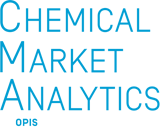Podcast: AFPM Wrap Up

Podcast by

Pablo Giorgi
Global Olefins

Luka Powell
Financial & Capital Markets
Our podcasts are available on all leading platforms including SoundCloud, Spotify & Apple.
You can also read the transcript of this week’s podcast below.
Luka Powell (00:16):
Welcome to the Olefins Weekly wrap up. Today is Friday, March 31st, and I’m your host, Luka Powell.
Pablo Giorgi (00:25):
And I’m Pablo Giorgi.
Luka Powell (00:27):
And together, as Chemical Market Analytics, we recap the top events moving the ethylene and propylene markets over the past week. The design of this podcast is to complement the content from the North America Light Olefins weekly service, otherwise known as the NALO weekly. We’re just coming off the back of two major conferences for our industry by AFPM: the Refining Annual Meeting, and the International Petrochemical Conference in San Antonio.
Pablo Giorgi (00:57):
It was a busy conference. Our meeting room was bustling with clients and other market participants who wanted to know our takes on the current climate and what the future holds for our industry.
Luka Powell (01:09):
So, for those of us who were unable to attend, could you give us a flavour of the general mood of the industry?
Pablo Giorgi (01:17):
Of course. The industry seems to have accepted the fact that we are not in a post-COVID boom anymore, and the economy is facing challenges and looking to understand how it’s going to recover and when that’s going happen. Depending on the region, also the mood is a little bit different.
Our Asian clients, especially in Southeast Asia, South Korea, Japan, are really concerned about the low margins for naphtha cracking and trying to understand when that’s going to recover. While globally, all of our clients want to know when is China demand going to come back, the effect of the debt on trade flows and margins globally. And so I would say the mood is not as good as, as it was a year ago. But definitely, people understand we’re going probably to have some sort of mild recession and are trying to see the way forward after that.
Luka Powell (02:44):
And what about from our clients’ perspectives? What do you think their main concerns are? If you could summarize them?
Pablo Giorgi (02:52):
Yeah. I think everybody is concerned, but also has come to accept the fact that both for ethylene and propylene, we have overbuilt capacity globally and especially startups this year. And, and it’ll take some time to increase operating rates after that. But there seems to be a very strong interest in understanding also about bio feedstocks, both bio ethylene and bio propylene in different regions and, and particularly in the West. I was surprised to hear you know, a lot of interest about that.
Luka Powell (03:40):
Interesting. Could you give us a little bit of an explanation or deeper dive into what bio feedstocks actually are?
Pablo Giorgi (03:48):
Yes, of course. When I talk about bio feedstocks, ethylene and propylene are basically referring to feedstocks from renewable sources, biological from plants. And so ethylene from ethanol, for example, is one thing that there are several companies talking about, several projects that are moving forward and about to be FID.
And then in the case of propylene, you can also use that same ethylene produced from ethanol that can come from either corn domestically or from sugar cane. And in that case typically imported. And you can use that ethylene to go through a dimerization unit, produce butylene, and then together with the ethylene into a metathesis unit, produce propylene. And the advantage of going that route for having more sustainable feedstocks and decarbonizing the footprint of the plastics that are produced is that in the end you have the exact same product.
Pablo Giorgi (05:04):
And the way you did the decarbonization is through a sustainable feedstock rather than some different type of, of product. Although there’s still interest in things like PLA, for example, but definitely much more interest in those types of bio feedstocks.
And there are not only that ethanol route, but others as well, such as bio propane coming from renewable diesel production. So hydrogenated vegetable oil, then the propane produced can be run through APH and and produce bio propylene. So I think those are the two major routes where there’s been interest in developing something in the US but in general, I would say the interest in bio feedstocks has grown significantly.
Luka Powell (06:02):
So while we’re on the topic of decarbonization, what was the sentiment around it? Obviously, it’s an important and necessary step for us to be taking, I guess as a society, but this likely comes with some concerns for the industry, especially as plastics alternatives are often higher in terms of carbon emitting than plastic is itself.
Pablo Giorgi (06:25):
Yes, I would say all companies that were mostly reinforcing the commitments that they had already made for reaching carbon neutrality to at a certain point at a certain year, and then maybe even carbon, zero carbon emissions further into the future. And they were all both reinforcing those commitments as well as in all cases that I’ve heard you know, they were on track to meeting those commitments. So the industry remains committed to that. There’s not been a lot of new targets on that front. But in general developments, I would say is where we are some developments in terms of continue to pursue those targets and being on track with those.
Luka Powell (07:27):
Cool. So another, I guess, sustainability-related topic is electric vehicles. What did you hear from clients and other members at the conference about how the industry sees electric vehicles at the moment as a potential opportunity?
Pablo Giorgi (07:45):
Yes. So I would say, you know, electric vehicles are focused globally and in different regions. We have different rates in which they are adopted. Obviously China is leading the world in terms of the percentage of electric vehicles. As part of new vehicle sales, I believe last year around 30% of new vehicles were electric. Europe is also migrating electric vehicles more rapidly.
The US is more slowly in that going on that path, but definitely moving in that direction as well. This year we had around 6% of the new vehicles sold were electric, and in January 7% were electric. So we are also increasing new vehicle sales, electric new vehicles as a percentage of, of all new vehicles sold. And the industry I think sees it as an opportunity.
Pablo Giorgi (08:56):
In terms of the US market, the Inflation Reduction Act passed last July has incentives for consumers to buy electric vehicles. And those incentives are linked to a percentage of domestic material used in the vehicles. And domestic material includes Mexico and Canada and some other countries with which the US has trade agreements with. And so the industry definitely welcomes the domestic content requirements.
Those percentages vary and increase year-over-year to give the industry time to develop the domestic suppliers. But I think it’s a great opportunity to develop US-based manufacturing for all of the car, the vehicle parts that are going to be in those electric vehicles. So in general I would say there are lots of opportunities. And with that, let’s wrap up the Wrap Up.
Luka Powell (10:05):
To hear the latest development on all of these crucial issues and many others, and to speak with other industry experts, register for the World Chemical Forum in Houston in September this year. Take advantage of the early bird discount by registering.
Now, don’t forget to subscribe to our podcast on SoundCloud, Spotify, or wherever you get your podcasts, and give us a like, or leave a review if you enjoy it. If you have any questions or would like us to cover something more specific, you can send us an email. Until next time.
Expand Your Reach in the Olefins Markets

Embracing the Infinite Possibilities
Chemical Market Analytics by OPIS, a Dow Jones company, with participation from The Wall Street Journal, Barron’s, and Factiva, presents the 2023 World Chemical Forum, a new event that redefines comprehensive exploration of the future of chemicals and energy, their inter-relationships, and how both markets will address global challenges this century.
Energy and chemical markets are evolving in profound ways and ushering in a fourth historical industrial and social revolution with Infinite Possibilities. Leading global experts and industry executives from all market sectors will convene to hear expert forecasts for key chemical and energy markets and discuss pivotal initiatives including chemical sustainability, the evolving logistics landscape, risk management strategies, and the future impact of Asia on the world.
The comprehensive agenda includes one day dedicated to a global view of the current and future chemical market and two days of guidance on the specific trends shaping the market.
Don’t miss any of it: register now and ensure your attendance at this exciting inaugural event!
